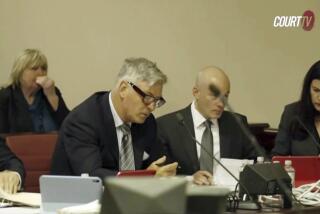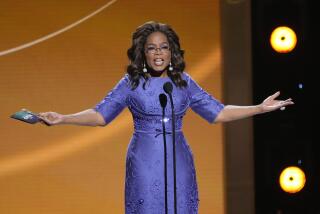Oprah Is in the Courthouse to Do Civic Duty as a Juror
- Share via
CHICAGO — In the hallowed halls of the Cook County Criminal Courthouse, crowds of television cameramen and reporters were clamoring for a comment -- not from a defendant, but from a juror.
Oprah Winfrey, the billionaire head of a media conglomerate, had been tapped for jury duty in a murder case.
Winfrey, who was selected Monday, said she had been excused from the civic process twice before: once because of a trip to Africa, and the other because the duty would have conflicted with TV sweeps week. But this time, no vacation or ratings race prevented her from sitting in the jury box.
Like many of her fellow jurors, she wasn’t pleased.
“Oh, happy day,” Oprah grumbled when she learned that she was picked from among the 50 possible jurors to spend at least three days hearing the case of Dion Coleman, who has been charged in the shooting death of Walter Holley.
Winfrey will be paid $17.20 a day for the service -- as opposed to the estimated $493,150 she averages each day of the year. Her income for 2003 reached $180 million, according to Forbes magazine.
In exchange, Winfrey will hear the details of Coleman’s case, with opening arguments Monday. None of the town’s leading newspapers, TV stations or radio programs had previously reported on the case.
In February 2002, Coleman, 27, allegedly gave a counterfeit $50 bill to Holley, 23. The two men argued and began to strike at each other.
Friends broke up the fight. Later, authorities say, Coleman approached Holley, this time carrying a gun, and shot him to death.
“I would not have me on the jury; I am too opinionated,” Winfrey told reporters Monday outside the courtroom. “Nearly everything that I can hear in a trial, I have heard in my show.”
As so many others have done, Winfrey did see a chance to get out of jury duty. On Monday, Judge James B. Linn asked the prospective jurors whether they would hold it against Coleman if he refused to testify. One woman raised her hand.
When the judge peered over his bench and asked the woman’s name, she simply replied: “Oprah.”
But later, when Linn pressed Winfrey about the matter, the talk-show host acknowledged that she would be the kind of juror who would give a verdict based only on the evidence presented in court.
Four and a half hours later, Winfrey and her fellow jurors were sworn into service. Attorneys for both sides declined to comment on why Winfrey made the cut.
“I’m just hoping [the trial] doesn’t take longer than a week, because I’ve got shows to do,” she said.
In Los Angeles, actors and filmmakers say they often claim “financial hardship” to avoid jury duty, saying that serving their civic duty can conflict with shooting schedules and cost them a job.
A similar approach was used by celebrities in New York until the 1990s, when citywide changes to the system were put into place and the courts rescinded many exemptions.
In Chicago, court officials say, there aren’t enough celebrities to worry about it.
They do, however, get certain perks. Dressed in chic yellow pants and a fitted sweater set, a well-coiffed Winfrey walked into the courthouse through a back entrance for court staff and security.
After clearing her purse through the security line, she was swept through the administration offices to where the jury pool waited.
But not before her fans spotted their favorite daytime TV personality.
“Oprah Winfrey!” screamed Charlene Thomas, 36, who was at the courthouse waiting for her sister to be arraigned in another case. “Girl, what are you doing here?”
But before Thomas could get an autograph, Winfrey was surrounded by security guards and heading up to the courtroom.
“My wife thinks she’s a goddess,” said Karl Wheeling, 42, while waiting in the lobby to meet with his brother’s defense attorney.
“Me? I think she’s just like the rest of us. She might be richer, but she’s stuck here at the courthouse, isn’t she?”






